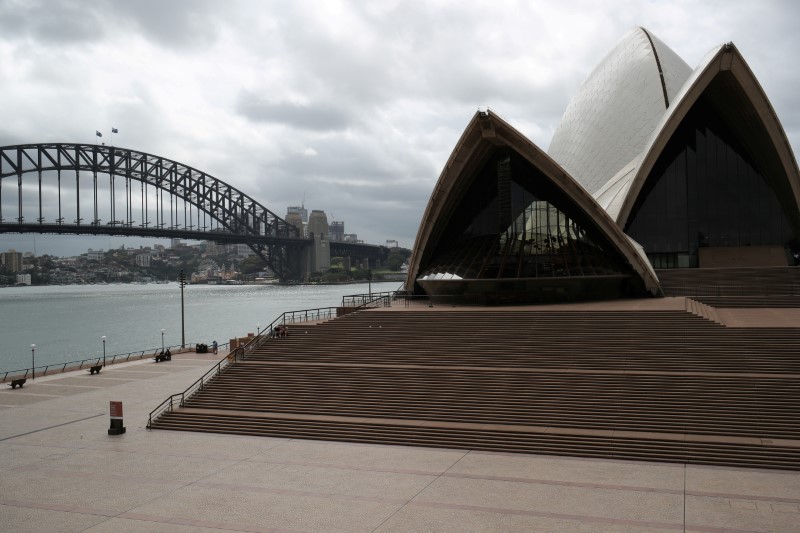By Swati Pandey
SYDNEY (Reuters) - Australia's economy has fallen into recession, the country's treasurer said on Wednesday, after data showed gross domestic product fell last quarter as entire business sectors were closed to fight the coronavirus.
The A$2 trillion ($1.39 trillion) economy contracted 0.3% in the three months ended March, the Australian Bureau of Statistics said, the first decline in nine years.
That took annual growth to 1.4%, the slowest since the 2009 global financial crisis, as the economy was hit by the worst bushfire season in living memory, a prolonged drought and a pandemic that shut down businesses and left many without jobs.
When asked if the country was already in recession, technically defined as two straight quarters of GDP contraction, Treasurer Josh Frydenberg answered in the affirmative.
"Based on what we know from Treasury, we’re going to see a contraction in the June quarter, which is going to be a lot more substantial than what we have seen in the March quarter," he told reporters in Canberra.
That would mark Australia's first recession since the early 1990s and end one of the world's longest growth streaks.
Household consumption was the biggest drag on growth last quarter with massive falls in spending on clothing, cars, transport, recreation, hotels, cafes and restaurants.
Net exports and government spending supported the economy in the quarter.
HUMAN TOLL
The economic fallout deepened in Australia as the number of local coronavirus cases surged from less than 100 in early March to more than 7,000 now, forcing the government to shut borders and restrict large gatherings.
Those curbs hit retailers and upended Australia's labour market with 600,000 people losing work and the unemployment rate spiking to 6.2% in April. The central bank expects unemployment to hit 10% by June and stay elevated for much of 2021.
Gurpreet Singh lost his job at a cafe in Sydney's west after it cut casual worker shifts. His home rental payments have now fallen five weeks into arrears.
To survive, he earns money delivering for UberEats on his pushbike and has turned to free food drives.
"This recession will be particularly bad for us young people," Singh, 29, said.
"This money from UberEats is not bad but I am worried about my future. It's going to be hard to find (permanent) work."
To help cushion the blow to the economy from the pandemic, the Reserve Bank of Australia (RBA) stepped in by cutting the cash rate to a record low 0.25% and launched an unlimited bond buying programme.
The government, meanwhile, unleashed a large fiscal stimulus plan, including a A$60 billion wage subsidy scheme.
Those stimulus measures are working as expected, RBA Governor Philip Lowe said this week, sounding less gloomy about the economy as health outcomes improved and businesses re-opened earlier-than-expected.
While Australia is in its worst downturn since the Great Depression, economists generally see growth returning in the third quarter.
"There are early signs of this improvement in the timely economic indicators," HSBC economist Paul Bloxham said. "Consumer sentiment is rising. Weekly employment numbers showed a pick-up in some industries... in early May."
Deutsche Bank (DE:DBKGn) economist Phil Odonaghoe said Australia has performed well by global comparison, suggesting its luck has not completely run out.
Of 19 rich world countries that have reported first quarter GDP so far, Australia has outdone 17 with only Sweden reporting a quarterly expansion. Those 17 economies fell 2.9% on average compared with Australia's 0.3% decline, Odonaghoe said.
Optimism about a second-half recovery as the economy reopened supported the Aussie dollar

($1 = 1.4391 Australian dollars)